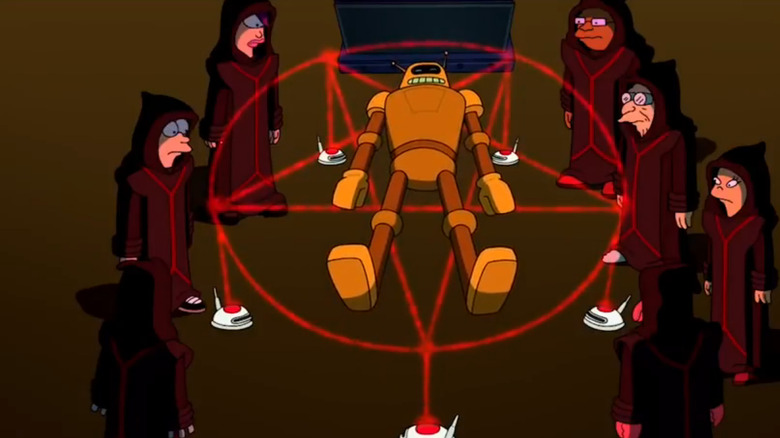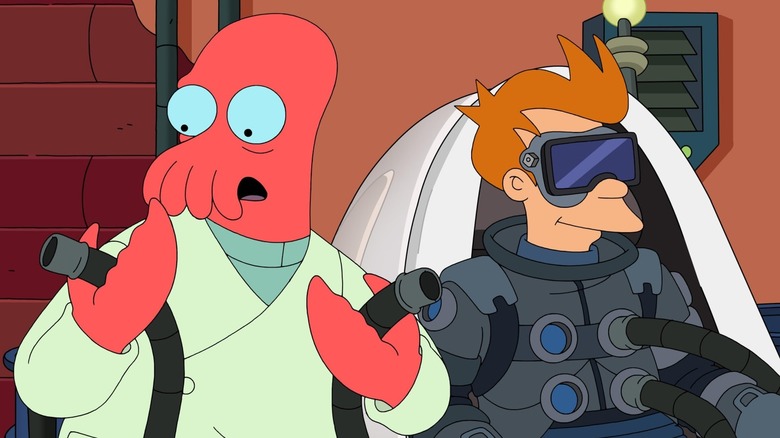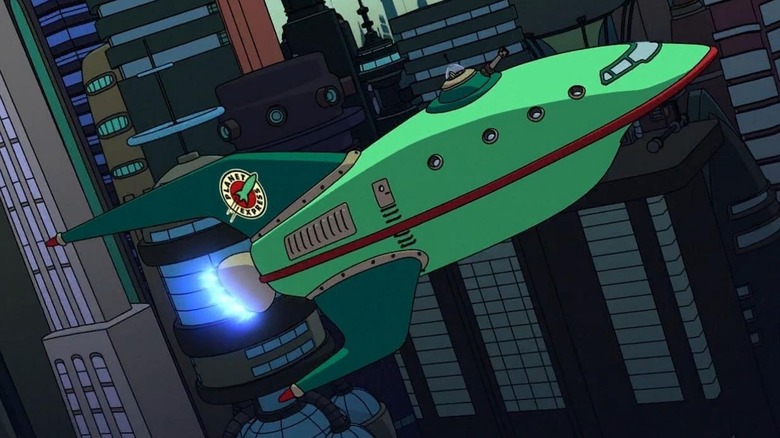Even Futurama's Creator Doesn't Quite Understand All Of Sci-Fi In The Show
In the "Futurama" episode "Calculon 2.0" (July 24, 2013), the famously hammy acting robot Calculon (Maurice LaMarche) had been dead for years, having swallowed poison on stage in an attempt to make his death scene more realistic. He had been replaced on the soap opera "All My Circuits" with a new acting robot named Vextron, and fans hated the new actor. Fry (Billy West) and Bender (John DiMaggio) are so disgusted with Vextron that they resolve to exhume Calculon's mechanical husk and reunite it with his free-floating memory, stored in an ineffable cloud somewhere. The Robot Devil (Dan Castellaneta) hands over Calculon's "soul," and Professor Farnsworth (West) sets up a very, very scientific reactivation process to reunite Calculon with his body.
The process requires the Planet Express crew to wear protective, lead-lined "robes," and active five laser-connect wireless network hubs ... that just happen to form a pentagram. They have to reverse-install Calculon's programming, which involves playing an installation disk backward. They also require a spare circuit board, which the professor carves out of a mechanical goat with a knife.
As Hermes (Phil LaMarr) points out, "This is the least scientific thing I've ever seen."
Ordinarily, the makers of "Futurama" have endeavored to make their show as scientifically based as possible. Their stories may be broad fantasies, but even their wilder conceits begin with an extant scientific or engineering precept. The above scene is a little joke at their own expense; when a sci-fi tale requires a fantastical story conceit, it may as well be a Satanic ritual for how plausible it is.
Matt Groening, the show's co-creator, admitted to the Los Angeles Times in 2013 that he leaves the science stuff to the show's many, science-minded writers. Groening doesn't really get it.
Hail, Science!
It's worth noting that the "Futurama" writers' room is chock-full of scientists, mathematicians, and holders of advanced degrees. Groening's co-creator, David X. Cohen, liked to brag that the writers' room contained a PhD in chemistry, a master's in philosophy, a master's in computer science, a master's in math, and a PhD in applied math. David X. Cohen himself has a master's degree in theoretical computer science from Berkeley. When it came to the sciences, the "Futurama" writers were very, very careful to make sure certain details were correct.
Naturally, such a nerdy imprimatur attracted nerdy viewers, keen to see certain scientific principles expressed in dialogue, and miffed when certain high-tech sci-fi concepts proved to be inconsistent. When asked if "Futurama" got analytical letters, Groening said:
"Very analytical. Some are very appreciative, some annoyed at the inconsistencies — because there is inconsistency. How do you get around the universe that's so huge? Originally we planned to have the spaceship powered by the MW drive, which is 'magic wand.' All science fiction has that magic wand where you can travel through galaxies very quickly. And, instead David had a friend who had a theory that you could slow down the speed of light and therefore make things faster."
/Film previously wrote about how Cohen and his physicist friend David Schiminovich "covered" faster-than-light travel. It's impossible for a craft to travel faster than light, so Cohen and Schiminovich said that in the future, the speed of light will somehow be made even faster, allowing starships to travel over 670 million mph without traveling through time. It's an absurd conceit that covers a real scientific principle. That was enough of a "magic wand" for Groening.
Sci-fi references that Matt Groening doesn't understand
Groening also said that he didn't understand what fuels the ships in "Futurama," even though Cohen and his writers explain it strenuously. "I never understood it," Groening said, "but that's what happens. And the ship is fueled by dark matter, whatever that is. Again David Cohen could explain, as could all the writing staff, except me."
Groening is a sci-fi fan going way back, but he's no deep-cut Trekkie, nor is he an avowed Starwoid, Whovian, or Juggalo. When it comes to specific references culled from pop sci-fi properties, Groening admits that he also hands things off to Cohen and his staff. He said:
"We have 'Doctor Who' references on 'Futurama,' but we have a lot of science fiction references that I don't get; but in the staff we have experts on 'Star Trek,' 'Star Wars,' 'Doctor Who' and 'Dungeons and Dragons.'"
D&D fans might smile when a Rust Monster or a Beholder makes a cameo appearance, but Groening would be baffled; he's not overseeing such small details. Groening, instead, oversees the general design and look of the show — it is based on his art — as well as story and character; he authored the series bible. Beyond that, Cohen and his cognitive cronies confer clever conceits.
As of this writing, "Futurama" was recently resurrected on Hulu, saved after a third cancelation and resurrection. It will continue to live on that service, with Cohen making new episodes for at least two more seasons. Like a star-forming galaxy 12.8 billion light-years away from Earth, "Futurama" appears to be permanent and eternal.


